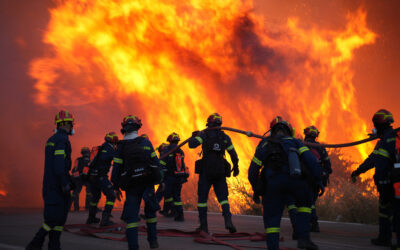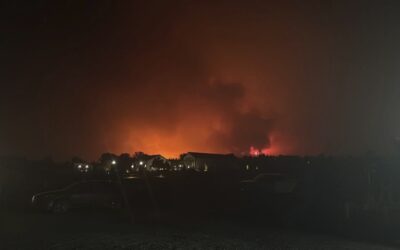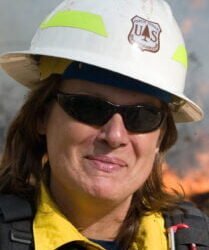For you federal firefighters out there, you’re probably closely watching the drama and BS back in our nation’s capital. You’re probably wondering if you’re going to lose a chunk of the pay you’ve been receiving for the last 2 years because Congress doesn’t seem to prioritize the work you do.
If you’re a contract firefighter, don’t think this is only about the feds. A rising tide lifts all boats. To prove that point, think about some of the municipal, district and state firefighters you know. Some of them make twice as much (or more) than we do. And eventually their tide is going to lift our boats as well. Or that’s what we’re counting on.
But back to the federal wildland firefighters. You’ve been enjoying the increased wages since the Bipartisan Infrastructure Law was passed in 2021. The funding was to last for 2 years while the federal agencies and Congress could address the major issues facing wildland firefighters in a cohesive bill. It wasn’t just about pay. The agencies, the White House and many elected officials recognized you’re facing critical issues beyond pay. Housing, burn-out, medical, mental health are all crucial, but pay must be addressed if the other issues can even be considered.
So here we are at the 11th hour. The Grassroots Wildland Firefighters, and your union, the NFFE (National Federation of Federal Employees) have been working non-stop advocating for you. To tell you the truth, there are so many people working behind the scenes trying to support federal wildland firefighters right now that I’m amazed by it all. If hard work was all it took for success, then you’d already be making more money, have quick access to competent medical and mental health professionals and you’d have a work schedule that was better than chattel labor from the 19th century. I can assure you; hard work is not enough.
So, what do we need? Why can’t Congress pass a bill that will address your pay, schedules and health benefits? It should not be this hard. Everyone loves firefighters, right? Firefighters are the beloved of all professionals. But wildland firefighters are always working in the shadows. Our fire engines aren’t shiny and bright and parked in the middle of the neighborhood for all to see. Our engines (both fed and private) are parked on some back road where the public isn’t even allowed to go. You’re doing some of the hardest work possible, and you’re doing it out of sight of the public. The public and Congress don’t know you. Not really.
That’s where Grassroots and NFFE come in. There’s been a lot of work done on your behalf to get Congress to understand the seriousness of the situation.
That’s why I’m writing on this topic again. A few months ago, I wrote an article in this publication called “Anchor in For The Future”. It was a more detailed description of “why” wildland firefighter pay needs to be raised. But this article isn’t about that. It’s about you. It’s about how you manage to literally survive while Congress is arguing about who is going to be in charge. If a type one IMT operated with all the skill and efficiency of Congress, they’d be sent home and disbanded, never allowed to embarrass themselves or their agencies again. But Congress has no such constraints. That’s why it’s possible thousands of federal wildland firefighters may lose a large portion of their salary in the next month.
I’m worried that federal wildland firefighters from all 5 agencies who haven’t already left, are looking at opportunities outside the federal service. I can’t blame you if you choose to leave and go to work for a local fire department, a state fire agency or even to drive a truck for UPS. They all make better money and have a better schedule than you as a federal wildland firefighter. But don’t give up…. Not yet.
I can’t tell you what’s going to happen in the next month. And I can’t tell you that hard core politicians aren’t going to try and balance the federal budget on the backs of you and your crew members. It’s not about you. Remember? They don’t even know you. It’s about politics. And you’re all just pawns on the chest board who can be sacrificed for their political gains.
In the meantime, you’re trying to buy groceries, pay rent, maybe even save something for your kid’s college education. That, while your pay may be reduced by 20 to 30% in the next month. Doesn’t sound like I’m doing a good job of convincing you not to leave the federal wildland service.
On the plus side, the agencies are busting their tail trying to get you the pay and benefits you deserve. To be honest, I’m amazed at how hard they’re working to improve your situation. But they know if they fail, you bail. Whatever their motivation, let’s be thankful our agency leadership in DC is working hard for you.
There are still things you can do while Congress is mucking around having grammar school fights about who’s in charge. You still have time to talk to your senators and congressmen and women. Don’t let them forget about this issue. Write, call and make sure they don’t have time to forget about you, your spouse and your children. And if all you have is a Toyota Tacoma payment, that’s ok too.
I can’t and won’t tell you not to take a new job that offers better pay, benefits and schedule. I’d be a hypocrite if I did. Back in 1980, I did the exact same thing and left the feds to work for a fire district. Better pay, benefits and schedules. I get it. But I came back to the feds after a divorce needing a new opportunity, and I got it.
Before you leave for greener pasture, please take the time to make the calls, send the letters and ask all your family and friends to do the same. There aren’t any guarantees of success, but we all need to try. We need to do our part to educate the congressmen and women. Because then, if they fail, then you can bail.
Now Available
Both Sides of the Fire Line is Bobbie Scopa’s uplifting memoir of bravely facing the heat of fierce challenges, professionally and personally. It’s available now.
Order from Amazon Order from Barnes & Noble
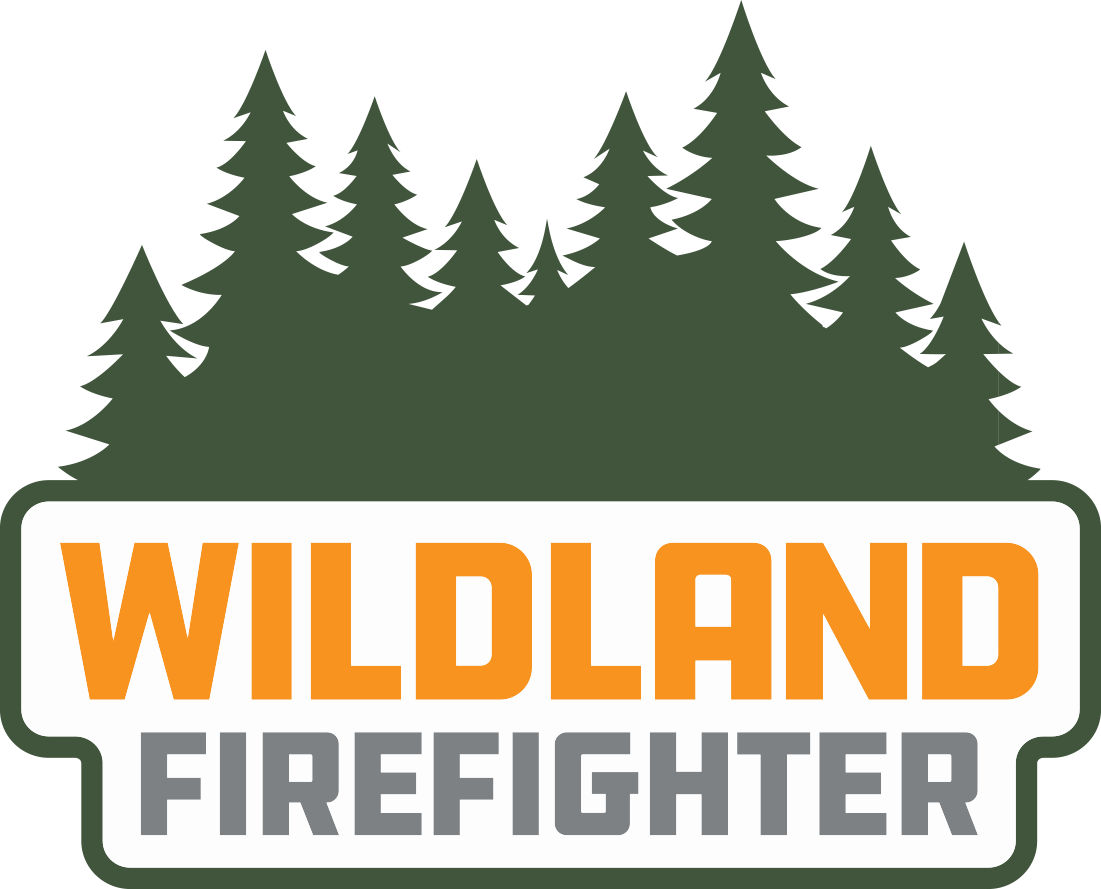
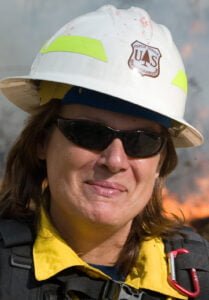 Bobbie Scopa started her career as a seasonal firefighter in 1974. After graduating from Arizona State University, she went on to work in fire and natural resource management. Eventually she left the wildand agencies to work full time for a structure fire department. She finished her Masters in Forestry at NC State then went back to the US Forest Service and BLM eventually becoming the Assistant Regional Fire Director in Region 6. Bobbie has spent many years working as a type 1 and 2 Operations Section Chief. You can listen to Bobbie tell audio stories from her long career at BobbieOnFire.com. She has also recently completed her memoir titled “Both Sides Of The Fire Line”. It will be available through Chicago Review Press late summer of 2022.
Bobbie Scopa started her career as a seasonal firefighter in 1974. After graduating from Arizona State University, she went on to work in fire and natural resource management. Eventually she left the wildand agencies to work full time for a structure fire department. She finished her Masters in Forestry at NC State then went back to the US Forest Service and BLM eventually becoming the Assistant Regional Fire Director in Region 6. Bobbie has spent many years working as a type 1 and 2 Operations Section Chief. You can listen to Bobbie tell audio stories from her long career at BobbieOnFire.com. She has also recently completed her memoir titled “Both Sides Of The Fire Line”. It will be available through Chicago Review Press late summer of 2022.